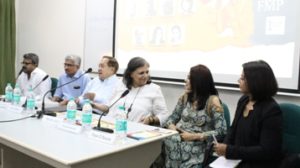Panel discussion on threats to journalism organised by Foundation for Media Professionals and The Lede, October 22, 2017
A panel discussion was organised by Foundation for Media Professionals and The Lede, at the Asian College of Journalism, October 22, 2017 on the various threats to journalism.
The discussion, by two panels, had veteran journalists talking about how the State’s overreach, extremist ideologies, social media harassment and intimidation had put journalism and journalists at risk, and how the political class was making the media irrelevant.
Ravish Kumar, Senior Executive Editor of NDTV India, said fearless journalists were humiliated, isolated and eventually killed for speaking the truth. He recalled how Gauri Lankesh, a freelance journalist was shot dead in Bengaluru recently.
“Aspiring journalists should carry a clean past and uphold integrity. Honesty is the touchstone of journalism. It helps journalists investigate bigger issues,” said Kumar, replying to a student’s question.
N Ram, Chairman, The Hindu Group of Publications Private Limited, said India belonged to the notorious club of shame under the ‘Global Impunity Index’ compiled by the Committee to Protect Journalists. It was one of the few countries where investigation into murders of journalists remained pending for years, he added.
India is ranked second in the index after Philippines. The index calculates impunity levels in 69 countries on the basis of human rights violations, efficiency of justice delivery institutions and law enforcement.
Mukund Padmanabhan, Editor-in-Chief of The Hindu, said that social media had rendered journalists irrelevant since leaders could now communicate with masses directly.
Faye D’souza, editor, Mirror Now, said that journalists regularly faced trolls and abuse on social media. She called upon the media fraternity to unite against such attacks online.
Ma Foi K Pandiarajan, Tamil Nadu Minister for Tamil Development, Culture and Archaeology faced questions on how government officials were inaccessible to media persons under the erstwhile Chief Minister J Jayalalithaa.
“We have always accepted journalists. However, amma did not want to become a media created personality,” he said, claiming that AIDMK’s spokespersons were accessible.
Pandiarajan also said that politicians faced intimidation from certain sections of the media who blackmailed people and generated paid news. He stressed upon the need for a media regulatory body.
S Karthigaichelvan, Managing Director of Pulhiya Thalaimurai, said that once his channel had faced blackout in over 20 districts for carrying a report on farmer suicides in the state.
Veteran journalist from Kerala, B R P Bhaskar said that people had lost faith in journalism, as it did not connect with the community anymore. “We need to introspect and ask who we are producing news for,” he said.
Arun Ram, Resident Editor, Times of India, Chennai, said, “Journalists need to be tactical and not just fearless in confronting censure and intimidation. Blind courage leads to nowhere.”
The other panellists were Amar Devulapalli, Consulting Editor, Sakshi Group, Telangana; Ramachandra Murthy, Editorial Director of Sakshi Group; journalist and writer Revati Laul; PTRP Thiagarajan, MLA and IT wing head for DMK, Vidyashree Dharmaraj, Editor-in-Chief, Coval Point, and actress Gautami.

